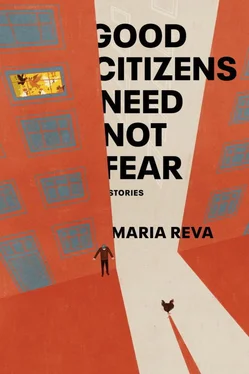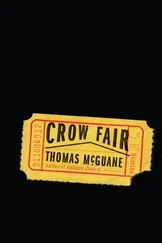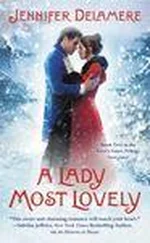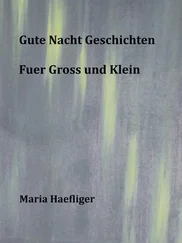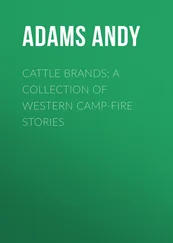Maria Reva - Good Citizens Need Not Fear - Stories
Здесь есть возможность читать онлайн «Maria Reva - Good Citizens Need Not Fear - Stories» весь текст электронной книги совершенно бесплатно (целиком полную версию без сокращений). В некоторых случаях можно слушать аудио, скачать через торрент в формате fb2 и присутствует краткое содержание. Город: New York, Год выпуска: 2020, ISBN: 2020, Издательство: Doubleday, Жанр: Современная проза, humor_satire, на английском языке. Описание произведения, (предисловие) а так же отзывы посетителей доступны на портале библиотеки ЛибКат.
- Название:Good Citizens Need Not Fear: Stories
- Автор:
- Издательство:Doubleday
- Жанр:
- Год:2020
- Город:New York
- ISBN:978-0-38554-529-7
- Рейтинг книги:3 / 5. Голосов: 1
-
Избранное:Добавить в избранное
- Отзывы:
-
Ваша оценка:
- 60
- 1
- 2
- 3
- 4
- 5
Good Citizens Need Not Fear: Stories: краткое содержание, описание и аннотация
Предлагаем к чтению аннотацию, описание, краткое содержание или предисловие (зависит от того, что написал сам автор книги «Good Citizens Need Not Fear: Stories»). Если вы не нашли необходимую информацию о книге — напишите в комментариях, мы постараемся отыскать её.
Good Citizens Need Not Fear: Stories — читать онлайн бесплатно полную книгу (весь текст) целиком
Ниже представлен текст книги, разбитый по страницам. Система сохранения места последней прочитанной страницы, позволяет с удобством читать онлайн бесплатно книгу «Good Citizens Need Not Fear: Stories», без необходимости каждый раз заново искать на чём Вы остановились. Поставьте закладку, и сможете в любой момент перейти на страницу, на которой закончили чтение.
Интервал:
Закладка:
She wakes when a pair of fingers press on her wrist, checking for a pulse.
She wakes when the corners of her sheet lift and she floats in the air for an instant. She screams and falls back down on the mattress.
She wakes writhing in hot wet sheets. Something hard slams into her side. When she disentangles herself, she is on the floor. Her sweaty palms slip on pale pink vinyl as she crawls to the door with the square window. She tries the knob, beats her fists against the door. She slumps back down to the floor, a heap of bones. Coughs erupt through her mouth and nose in painful spasms, expelling a frothy pus—not into her hand, but in the crook of her elbow, as she has been taught. Two limp-faced girls gaze down at her from their own beds, peaceful. All she needs to do is let it happen, their heavy-lidded eyes tell her. Give in, melt into the floor. Isn’t that what this room is for—a long rest? Her lungs will unclench, fill to the brim like two bottles of milk, and the sanitarki will take her away. That’s when the parents come at last. Zaya has seen them visit once their child is safe in a small box. A nurse might even sew up her lip for the occasion.
Her head rolls to the right. In the corner of the room, a crack in the vinyl floor glows.
What she has to do is crawl toward that crack. The need is bodily, instinctual. She has seen it in every moth and mosquito bewitched by a flame.
Right hand, left knee, left hand, right knee. Her joints grind painfully, her elbows buckle, but she keeps moving.
Zaya lifts the corner of the vinyl. It peels away easily, revealing a pair of short loose planks. The glow beckons her from beneath them. Panting, she pulls the planks aside. A small hole in the floor opens up to a set of stone steps leading underground. The tunnel’s cool breath gives the girl a burst of strength. She stands on shaky legs. Strings of cobweb cling to her arms and face as she follows the light down the cold steps, which level out into a chamber. Long narrow shelves are carved into the stone walls. Broken candles and vases litter the floor—remnants of pillage. The air smells sweet, like a baby’s mouth after feeding.
The glow emanates from a corner of the chamber, from underneath a gray pile of robes. Zaya unwraps them—the cloth’s folds retain a bluish luster—and the unsettled dust brings on another coughing fit. Inside is a mummified body. Or, half of one. The legs appear to have been snapped off. The brown leathery face squints up at Zaya. Its mouth, petrified midscream or midyawn, suggests the creature met its end in wretched terror or sublime repose. Its hair and beard are the yellow of dead grass, but its teeth gleam white. The hands cross at the chest, skin stretched between knuckles like a bat’s wings. Beside the creature lies a dark red cylindrical hat Zaya has seen before, atop the bishops painted on the monastery walls—but on this hat, the jewels have been picked out.
Zaya beholds the shriveled face, and determines from its gaze that something awaits her, something important. The saint, she knows, doesn’t want to be buried at the internat any more than she does.
Zaya tugs the hat over its shiny forehead. The hat is fetching. A waste indeed, to be a saint stuck underground with such a hat.
She gathers the saint in her arms. Centuries of desiccation have made its body very light. The saint pulls forward, as though tied to a string. The pair make their way through the tunnels, turning right here, left there, the bundle leading her through the dark, urging her toward the miracle of escape. They totter up a set of steps, toward an opening. Zaya smells the leaves before she sees them. Gripping the saint with one hand, pulling the branches and weeds apart with the other, she climbs over a clutch of tree roots.
The blue sky greets them.
Zaya leaps forward, ready to run from the internat, run as far as her aching legs will take her. But then she stops.
They’re outside the building, but still inside the tall iron fence.
Before Zaya can feel the blow of defeat, the bundle pulls her back into the tunnel—and Zaya follows.
Down the tunnel they go, then to the left, right, left again. They reach an opening in the cliff face. The only way down here is a fall to the jagged rocks below. Back into the tunnel they go. The saint’s pull is stronger now, the pruney creature in Zaya’s arms frantic to perform its marvel, and she frantic to witness it. Right, left, another left.
They’re outside again, but still inside the fence, this time just a few steps shy of the forest beyond.
Zaya waits for direction. The saint, now inert, gives none. She shakes it. In the daylight, its parched features look exhausted, accepting their fate. At least one of them can escape, Zaya thinks. She thrusts the bundle over the fence. The saint lands faceup on the wild grass, hat uncapped in salute.
Zaya hears a sanitarka call her name, turns to see the woman racing toward her. Just a few meters away now, the woman’s creamy arms are spread wide enough for an embrace.
When Zaya slides her leg between the rods of the fence, she doesn’t expect the rest of her body to follow—but it squeezes right through. She picks up the saint, and runs for the pines.
LETTER OF APOLOGY
Don’t think.
If you think, don’t speak.
If you think and speak, don’t write.
If you think, speak, and write, don’t sign.
If you think, speak, write, and sign, don’t be surprised.
News of Konstantyn Illych Boyko’s transgression came to us by way of an anonymous note deposited in a suggestion box at the Kirovka Cultural Club. According to the note, after giving a poetry reading, Konstantyn Illych disseminated a political joke as he loosened his tie backstage. Following Directive No. 97 to Eliminate Dissemination of Untruths Among Party Cadres and the KGB, my superior could not repeat the joke, but assured me it was grave enough to warrant our attention.
One can only argue with an intellectual like Konstantyn Illych if one speaks to him on his level. I was among the few in the Kirovka branch of the agency with a higher education; the task of reeducating Konstantyn Illych thus fell to me.
Since Konstantyn Illych was a celebrated poet in Ukraine and the matter a sensitive one, I was to approach him in private rather than at his workplace, in case the joke had to be repeated. Public rebuke would only be used if a civil one-on-one failed. According to Konstantyn Illych’s personal file (aged forty-five, employed by the Cultural Club), the poet spent his Sundays alone or with his wife at their dacha in Uhly, a miserable swampland 30 kilometers south of town.
Judgment of the quality of the swampland is my own and was not indicated in the file.
The following Sunday I drove to Uhly, or as close as I could get to Uhly; after the spring snowmelt, the dachas were submerged by a meter of turbid water and people were moving between and around the dachas in rowboats.
I had not secured a rowboat for the task as the need for one was not mentioned in Konstantyn Illych’s file, nor in the orders I was given.
I parked at the flood line, where five rowboats were moored: two green, two blue, one white, none black. Usually, our mode of transportation was black. I leaned on the warm hood of my car (black) and plucked clean a cattail as I deliberated what to do next. I decided on the innocuous white; I did not want to frighten Konstantyn Illych, and cause him to flee, by appearing in a black rowboat.
The dachas were poorly numbered and I had to ask for directions, which was not ideal. One man I spoke to was half-deaf and, after nodding through my question, launched into an account of his cystectomy; another elderly man, who clearly understood Russian, rudely responded in Ukrainian; one woman, after inquiring what in hell I was doing in her brother’s rowboat, tried to set her Rottweiler on me (fortunately, the beast feared water). I was about to head back to the car when an aluminum kayak slid out of the reeds beside me, carrying two knobby-kneed girls. They told me to turn right at the electric transformer and row to the third house after the one crushed by a poplar.
Читать дальшеИнтервал:
Закладка:
Похожие книги на «Good Citizens Need Not Fear: Stories»
Представляем Вашему вниманию похожие книги на «Good Citizens Need Not Fear: Stories» списком для выбора. Мы отобрали схожую по названию и смыслу литературу в надежде предоставить читателям больше вариантов отыскать новые, интересные, ещё непрочитанные произведения.
Обсуждение, отзывы о книге «Good Citizens Need Not Fear: Stories» и просто собственные мнения читателей. Оставьте ваши комментарии, напишите, что Вы думаете о произведении, его смысле или главных героях. Укажите что конкретно понравилось, а что нет, и почему Вы так считаете.
